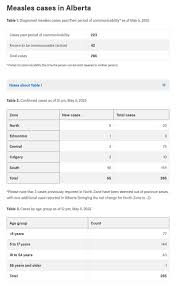
Introduction
Measles has reemerged as a significant public health concern, with outbreaks reported in various regions, particularly in Canada and across North America. Despite being a preventable disease, measles can lead to severe complications, making vaccination crucial for protection against this highly contagious virus. In recent years, public health officials have sounded the alarm regarding declining vaccination rates, which has contributed to the resurgence of measles. Understanding the importance of vaccination is key to safeguarding communities and preventing the spread of this infectious disease.
Current Outbreaks and Statistics
As of 2023, the Public Health Agency of Canada (PHAC) reported a marked increase in measles cases, with several provinces experiencing outbreaks. Public health officials highlighted that many affected individuals were unvaccinated or under-vaccinated. The World Health Organization (WHO) also notes that global measles cases have risen sharply, with an estimated 9.7 million cases documented worldwide in 2021 alone.
The recent outbreaks have been primarily linked to misinformation about vaccines and hesitancy towards vaccinations in certain populations. Health experts emphasize that one of the most effective ways to prevent the disease is through the MMR vaccine, which immunizes against measles, mumps, and rubella. The MMR vaccine is recommended for children, most commonly administered at 12 months of age with a booster shot before school entry.
The Importance of Vaccination
Vaccination not only protects individuals from measles but also contributes to herd immunity, a critical factor in preventing outbreaks, especially for those who cannot be vaccinated due to health reasons (such as infants or immunocompromised individuals). When vaccination rates meet or exceed 95%, the likelihood of outbreaks decreases significantly.
Experts are advocating for increased public awareness campaigns to address vaccine hesitancy and misinformation. They stress that parents should consult healthcare providers about the safety and efficacy of vaccines. Public health initiatives are underway to boost vaccination coverage among communities that have seen declines.
Conclusion
The resurgence of measles serves as a stark reminder of the importance of vaccination in maintaining public health. With current outbreaks in various regions, it is essential for communities to rally together to protect vulnerable populations through increased vaccination efforts. As we move forward, it is crucial to combat misinformation and ensure that immunization programs remain robust, ultimately aiming for a future where preventable diseases like measles are a rarity.



